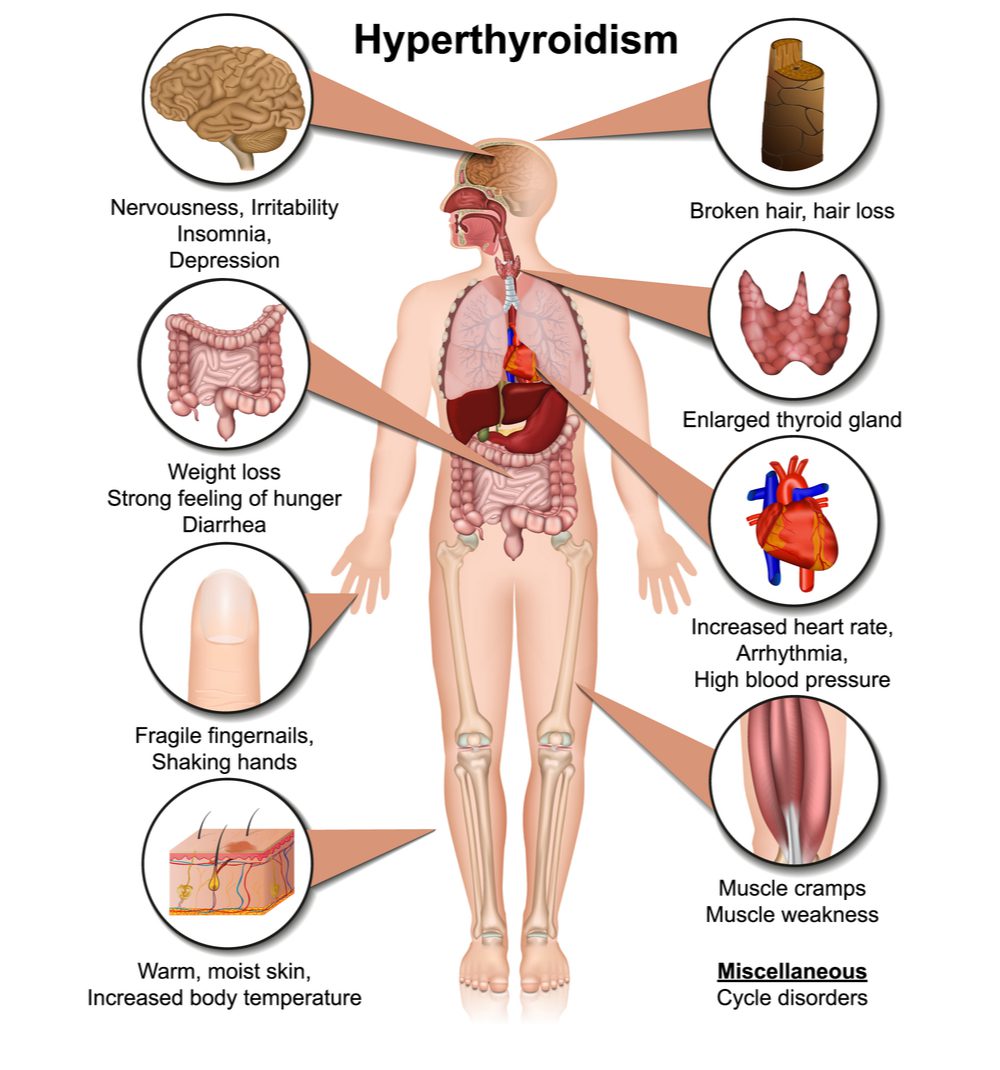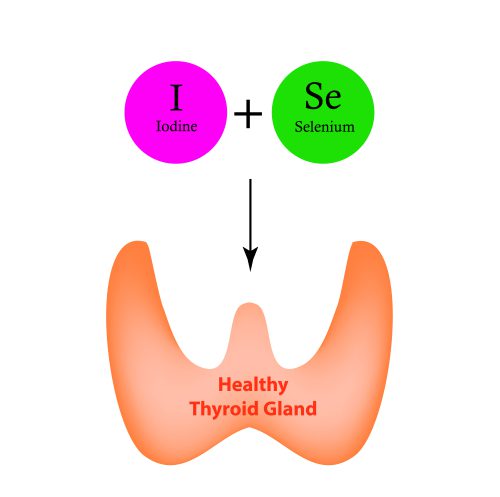
When it comes to general health, the importance of the small butterfly-shaped thyroid gland is often overlooked. Many people suffer chronic thyroid-related conditions, such as hypothyroidism and Hashimoto’s. The ketogenic diet is renowned for providing a range of health benefits, but what about thyroid health?
How does going keto affect your thyroid gland and hormones? If you have a thyroid condition, should you try a ketogenic diet? Let’s discuss keto, the thyroid, and the research!
What Is the Thyroid?
The thyroid is a gland located in the neck, and it resembles the shape of a butterfly or a bow tie. It’s difficult to feel the thyroid gland normally, but doctors can easily feel it if it’s enlarged or if a goiter appears (abnormal enlargement of the thyroid gland).
Thyroid hormones are secreted from the thyroid gland. Thyroid hormones help control the rate of chemical functions in the body by increasing the amount of oxygen used in the cells and by stimulating body tissues to produce proteins.
Many of your vital bodily functions are affected by your thyroid hormones, including the rate calories are burned, growth, heart rate, digestion, skin maintenance, and fertility. With aging, the thyroid gland can shrink and shift lower down in the neck.
Thyroid Hormones
The two types of thyroid hormones are T4 ( thyroxine) and T3 (triiodothyronine).
Your thyroid gland produces the major thyroid hormone T4, which only has a slight effect on speeding up the body’s metabolic rate. T4 is converted in the liver and other tissues into T3, which is the more active hormone. Certain factors influence this conversion process, such as illness and the body’s needs at that time.

What are Some of the Most Common Thyroid-Related Conditions?
Some of the most common thyroid diseases and conditions include hypothyroidism, hyperthyroidism, and Hashimoto’s. Treatments for thyroid conditions vary, but some of the most common treatments include lifestyle changes, anti-thyroid medications, iodine, radioactive iodine to slow the production of thyroid hormones, and, in some cases, surgery to remove some or all of the gland.
Hypothyroidism
Hypothyroidism is a condition involving inadequate thyroid activity in the body, where your body isn’t producing enough thyroid hormones.
Symptoms usually include brain fog and difficulty focusing, weight gain, mood imbalances, and fatigue.
People diagnosed with hypothyroidism are often simply placed on thyroid replacement hormones without addressing root causes. [1]
Hyperthyroidism
Hyperthyroidism refers to an overactive thyroid: when the thyroid gland overproduces the thyroxine hormone. Due to an acceleration of the body’s metabolism, hyperthyroidism can lead to an irregular or rapid heartbeat or unintentional weight loss.
Other health problems present similarly to hyperthyroidism, so it can be difficult to diagnose. Symptoms include unintentional weight loss, increased appetite, heart palpitations, anxiety, irritability, heat sensitivity, and sweating. [2]


Hashimoto’s
Hashimoto’s might sound like a cute Pokémon or cartoon character, but it’s actually the name of a complex thyroid condition where the immune system attacks the thyroid and causes inflammation. Hashimoto’s occurs more commonly in women, but it can occur in men and children too.
There aren’t usually early signs of Hashimoto’s, but over time, some people experience swelling or a goiter at the front of the throat. Symptoms of Hashimoto’s are similar to hypothyroidism (underactive thyroid gland) and include fatigue, constipation, brittle nails, hair loss, unexplained weight gain, muscle aches and joint pain, and depression. [3]
How Does a Ketogenic Diet Affect Thyroid Health?
There is a prevailing notion that a ketogenic diet can have negative consequences for thyroid health, but this doesn’t seem substantiated with sufficient research or even anecdotal stories. There is some research that caloric restriction, protein restriction, and a keto diet can lower T3 levels, but more research is needed.
When TSH and T4 levels are normal, this lowering of T3 levels might actually be positive and beneficial, with some evidence pointing to the body’s natural physiological adaptation to preserve muscle mass and achieve a deeper state of ketosis. A drop in T3 enabled deeper ketosis and preserved muscle mass. [4] [5]
Interestingly, research associated lower T3 levels with a longer lifespan. Some people on keto restrict calories too much, which has been shown to lower T3 levels. This is likely the body’s protective response during times of scarcity.
Lower T3 levels might lead to symptoms of hypothyroid that are mistakenly attributed to a ketogenic diet. Make sure you’re consuming enough calories on your ketogenic diet to prevent your T3 levels from dropping too low. [6]
The thyroid might increase T3 production to deal with the glucose on a higher-carb diet. Consuming carbs increases your iodine requirements because your thyroid needs more iodine to make more T3 to deal with the carbs.
Inflammation
Communication takes place between the pituitary and hypothalamus of the brain, the liver, thyroid, and gut. Your brain constantly monitors your body and regulates signals sent to your thyroid. The signaling and conversion processes result in the production of thyroid hormones.
A ketogenic diet can improve T4-T3 conversion and reduce inflammation, which is a common cause of hypothyroid. Inflammation plays a role in conditions and autoimmune diseases and distracts the immune system. Lowering inflammation can be particularly advantageous for autoimmune thyroiditis like Hashimoto’s. [7]
Metabolism, Blood Sugar, and Insulin
Keto also helps improve metabolism, stabilize blood sugar, and balance digestive hormones, which allows for a more balanced production of thyroid hormones. Uncontrolled fluctuating blood sugar contributes to the development of advanced glycolytic enzymes (AGEs) — inflammatory proteins. AGEs seem to be more drawn to thyroid tissues and might negatively affect the production of thyroid hormones. [8]
Make sure you control your stress levels and avoid common food sensitivities. Reactive foods and stress result in a surge of the cortisol hormone and stimulate the release of glucose, which can cause blood sugar spikes even when you’re not consuming lots of sugars! Chronic stress also increases the production of rT3 (reverse T3), which essentially blocks T3 from functioning properly in the body. The symptoms of this present similarly to hypothyroidism. [9]
Controlling your blood sugar with the management of stress and a keto diet can improve your chances of success.
Hormone Conversion
Healthy hormone levels and the thyroid hormone conversion process requires certain important nutrients, such as:
- Selenium
- Iodine
- Vitamin A, C, and E
- B vitamins
- Tyrosine
- Zinc

Make sure you’re eating a diverse array of natural whole foods to obtain these nutrients, such as:
- Wild-caught fish
- Pasture-raised meats and dairy
- Nutrient-dense veggies and leafy greens
Strategic nutrient supplementation might be necessary in some cases.
Weight Loss
Irrespective of diet, weight loss seems to lower thyroid activity and reduce the conversion of T4 into active T3.
Highly Processed Vegetable Oils
Processed vegetable oils high in polyunsaturated fatty acids might exert a negative effect on thyroid hormone signaling, according to some research. On the other hand, healthy natural fats like those found in wild-caught fish and keto-friendly oils like olive oil might improve thyroid hormone signaling. Read our article for more info on which healthier oils and fats to cook with. [10]
In another example, rats consuming corn oil converted less T4 to active T3 compared to rats on a lard diet. [11]
Canola oil rich in polyunsaturated fatty acids is derived from rapeseed meal. When turkeys are fed more rapeseed meal, their thyroid signaling gets worse, and they produce fewer eggs and less meat. [12]
Keep in mind the omega-3 PUFAs (polyunsaturated fats) found in natural foods like seafood actually increase thyroid signaling in the liver. [13]
Lack of Stomach Acid and Pancreatic Enzymes
People with hypothyroidism often lack stomach acid, bile, and pancreatic enzymes, resulting in poor digestion. Supplements, such as betaine HCL might be helpful in some instances to improve digestion.
You could also try increasing calories and fats by adding in MCT oil and fats that don’t depend on bile for digestion and quickly turn to ketones in the body.
Intense Exercise
Excess psychological or physiological stress, including too much harsh or intensive exercise, can also cause the body to convert T4 into reverse T3, which essentially does the opposite of T3. Reverse T3 lowers metabolism and conserves energy to protect you in times of stress and scarcity.
Cyclic Ketogenic Diet
Some people dealing with thyroid disorders find a cyclic ketogenic diet is most advantageous, along with ramping up nutrient-dense whole foods. Some individuals find an apt time to implement healthier slow-digesting carbs, such as sweet potato, to restore and replenish glycogen. It’s up to you how you choose to implement a cyclic ketogenic diet. One popular variation is six days in ketosis and one day each week that’s higher in carbs.
Concluding Thoughts
Thyroid hormones and thyroid conditions are complex and depend on various factors, such as nutrition. Many people with thyroid disorders experience improvements and feel great on a ketogenic diet. It’s best to monitor how you feel on keto and visit your doctor or healthcare practitioner if you have any questions or concerns or experience any symptoms. You can also peruse our handy keto doctor finder!
Overall, a keto diet seems to positively affect thyroid health. Certain factors can negatively affect the thyroid and thyroid hormone production, such as:
- Stress
- Intense exercise
- Illness
- Caloric restriction
- Lack of bile, pancreatic enzymes, and stomach acid
- Weight loss
- Highly processed vegetable and grain-based oils like canola oil
You could try a cyclic ketogenic diet to see how that works for you. Browse our recipes to find nutrient-rich keto dishes!
References
Mayo Clinic. Hypothyroidism (Underactive Thyroid). Hypothyroidism - Symptoms and causes - Mayo Clinic
Mayo Clinic. Hyperthyroidism (Overactive Thyroid). Hyperthyroidism - Symptoms and causes - Mayo Clinic
Mayo Clinic. Hashimoto’s Disease. Hashimoto's disease - Symptoms and causes - Mayo Clinic
Economidou, F., Douka, E., Tzanela, M., Nanas, S., & Kotanidou, A. (2011). Thyroid function during critical illness. Hormones, 10(2), 117-124.
Kaptein, E. M., Fisler, J. S., Duda, M. J., Nicoloff, J. T., & Drenick, E. J. (1985). Relationship between the changes in serum thyroid hormone levels and protein status during prolonged protein supplemented caloric deprivation. Clin Endocrinol (Oxf), 22(1), 1-15. DOI: 10.1111/j.1365-2265.1985.tb01059.x
Rozing, M. P., Westendorp, R. G. J., De Craen, A. J. M., Frolich, M., Heijmans, B. T., Beekman, M., Wijsman, C., Mooijaart, S. P., Blauw, G-J., Slagboom, E., Van Heemst, D., Leiden Longevity Study Group. (2010). Low serum free triiodothyronine levels mark familial longevity: The Leiden Longevity Study. J Gerontol A Biol Sci Med Sci, 65(4), 365-8. DOI: 10.1093/gerona/glp200
McLeod, D. S. A., & Cooper, D. S. (2012). The incidence and prevalence of thyroid autoimmunity. Endocrine, 42(2), 252-65. DOI: 10.1007/s12020-012-9703-2
Koga, M., Murai, J., Saito, H., Matsumoto, S., & Kasayama, S. (2009). Effects of thyroid hormone on serum glycated albumin levels: Study on non-diabetic subjects. Diabetes Research and Clinical Practice, 84(2), 163-7. DOI:10.1016/j.diabres.2009.01.013
Hidal, J. T., & Kaplan, M. M. (1988). Inhibition of thyroxine 5’-deiodination type II in cultured human placental cells by cortisol, insulin, 3’, 5’-cyclic adenosine monophosphate, and butyrate. Metabolism, 37(7), 664-8. DOI: 10.1016/0026-0495(88)90087-x
Ullrich, I. H., Peters, P. J., & Albrink, M. J. (1985). Effect of low-carbohydrate diets high in either fat or protein on thyroid function, plasma insulin, glucose, and triglycerides in healthy young adults. J Am Coll Nutr, 4(4), 451-9. DOI: 10.1080/07315724.1985.10720087
Reed, E. B., & Tarver, H. (1975). The influence of diet on the lipogenic response to thyroxine in rat liver. Life Sci, 17(12), 1785-97. DOI: 10.1016/0024-3205(75)90461-0
Mikulski, D., Jankowski, J., Zdunczyk, Z., Juskiewicz, J., & Slominski, B. A. (2012). The effect of different dietary levels of rapeseed meal on growth performance, carcass traits, and meat quality in turkeys. Poult Sci, 91(1), 215-23. DOI: 10.3382/ps.2011-01587
Souza, L. L., Nunes, M. O., Paula, G. S. M., Cordeiro, A., Penha-Pinto, V., Neto, J. F. N., Oliveira, K. J., Carmo, M. G. T., & Pazos-Moura, C. C. (2010). Effects of dietary fish oil on thyroid hormone signaling in the liver. J Nutr Biochem, 21(10), 935-40. DOI: 10.1016/j.jnutbio.2009.07.008










